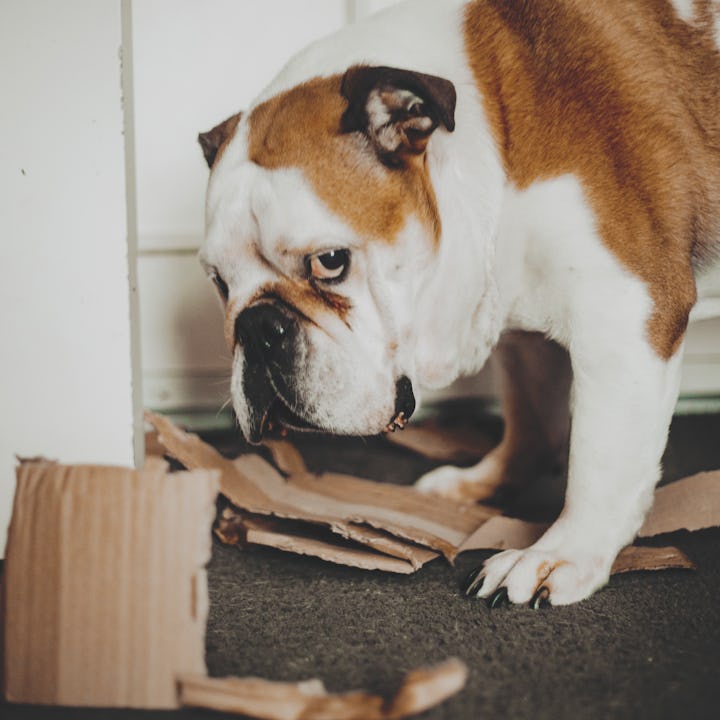Do Dogs Know When They're In Trouble?
Because those big guilty eyes seem to say, “Yes, I ate the remote even though I know I’m not supposed to.”

There are few things better than a dog. Whether your pup is super expressive or more stoic in their vibes, dogs just never really hide how they're feeling. You always know where you stand with man's best friend and, sometimes, that can be a little alarming. Like when you walk in the door after work and are met by your dog peeking around the corner with their ears back. So many times I've entered our home, expecting our dog to run to me, only to notice that he's being a little antsy. "What did you do?" I'll ask, and immediately, he reacts. This is when I discover something like the trash pulled out of the trash can or a tube of toothpaste gnawed into oblivion.
But do dogs actually know when they're in trouble? What about when they've completely forgotten something they've done and then walk into a room with you holding a half-chewed sock or pointing out a big pee stain in the carpet? Are they aware that what they did was wrong?
The answer is: kinda. But maybe not in a traditional human kind of way.
"In short? No, dogs don't know they're 'in trouble' — they judge it by how we are acting," says Ali Smith, canine behavioralist and CEO and founder of Rebarkable. "We often forget that our dogs communicate primarily via body language, so they will notice those tiny changes in your posture as you get frustrated or angry."
Because your dog is so in tune with you and your emotions, it's easy for them to see your happy demeanor change when you pick up the shredded toilet paper or find the empty box of treats they demolished while you were getting the mail. But it's not because they really know that what they did was wrong so much as not wanting you to be upset.
And if your pup has those guilty eyes looking up at you with their ears back, trust that they aren't necessarily feeling "guilt" over what they've done or putting those concepts together. "When people claim there is a noticeable 'guilt,' it's usually because their human is scary," Smith says. "So the dog is waiting with bated breath to see if the human will get mad."
Well! Now don't you feel horrible for getting frustrated?
"Humans have to be able to understand that a dog runs on instinct and its temperament," says JustAnswer dog behavior expert Sally Grottini. "They do not understand the English language unless each word is taught to them with a meaning. For instance, you want the dog to sit, so you teach them what it means to sit by rewarding them when they sit after the command is given. It can take a week of training one command before the dog understands and does what the human wants. If a word is not taught for an action, the dog does not know what the owner wants."
And that means "trouble" is not something they conceptually grasp.
Grottini says that dog behavior is usually just a reflection of them trying to take care of themselves and their needs. If you're finding torn-up garbage or blankets and clothing, she says your dog is rooting, and it's part of their natural instinct to find something or for entertainment. "Dogs often act out of boredom," she says. And it's your reaction to what they've done that causes their response — not the idea that they've actually been naughty.
"When humans find a mess in the home, they are usually angry, and their tone of voice and body language tell the dog not to go near them," Grottini elaborates. "The dog may cower, look sorry, or sad, but the dog is really actually afraid of the owner due to the owner's tone and stiff body language."
To avoid these situations, you need to make sure your pup is in a safe environment and has everything they need — like water, frequent potty breaks, boredom-busting toys, etc. Of course, your dog may do something that you're not happy about, but with consistent training and attention, a lot of issues can be fixed... without you scaring your dog.
"It's never a good idea to put human emotions on a dog, as they do not run on emotion; they run on instinct to survive," Grottini says. So know that your dog doesn't really know if they're in trouble or not — they just know you're mad. And goodness, who wants to be mad at a sweet little face like your pup's?